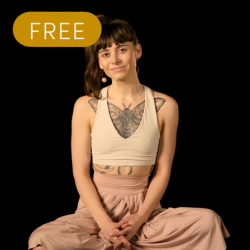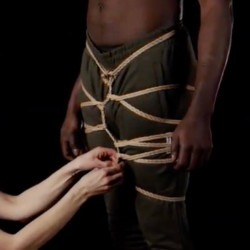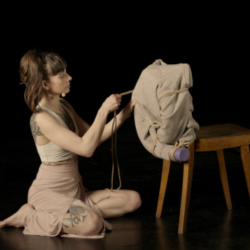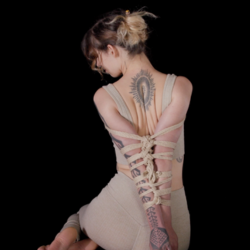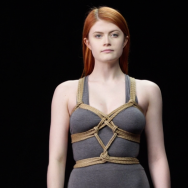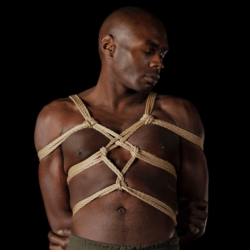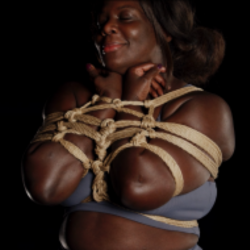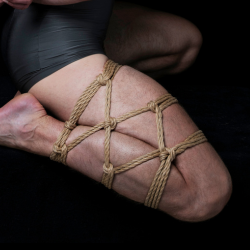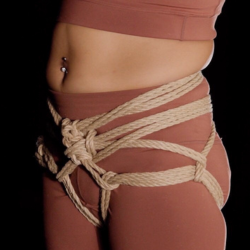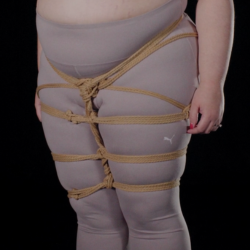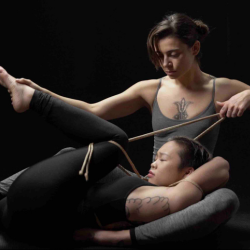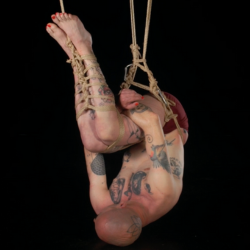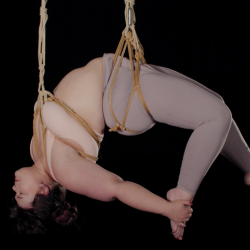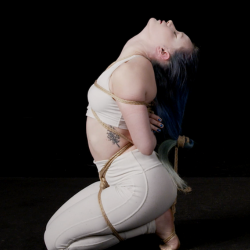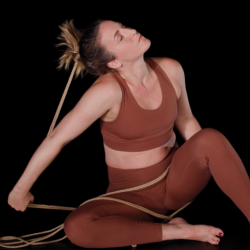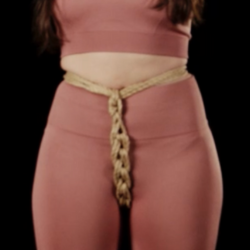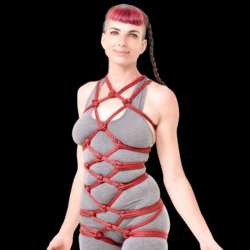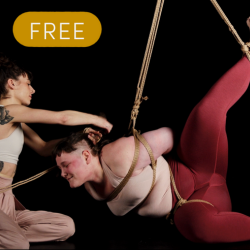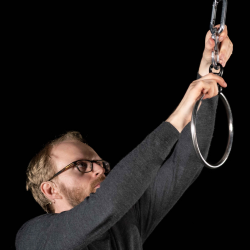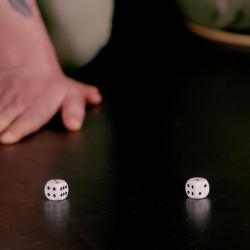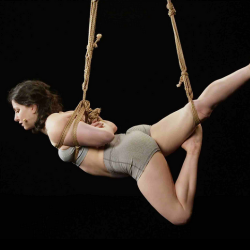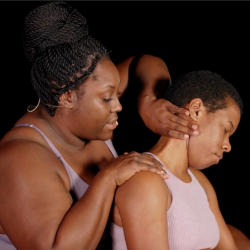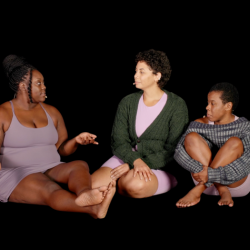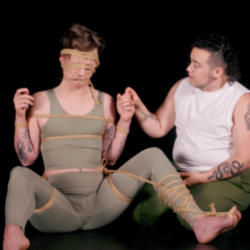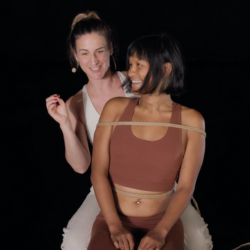EP 11
THE SILENCE
In this episode, The Silence shares his photography journey and unveils some secrets to learning how to capture amazing images.

The Silence is a professional photographer who centers his work around rope, kink and boudoir.
Wicked Wren [00:00:21] Hello and welcome to the Shibari Study podcast. I'm your host, Wicked Wren. And today we have The Silence. You'll know The Silence from his amazing photographs. They combine rope bondage and high fashion. So welcome. How are you?
The Silence [00:00:39] Hello, hello, hello.
Wicked Wren [00:00:41] Hello. Like I said, you're a photographer that incorporates elements of traditional modeling, rope bondage, high fashion in your work. Where does that come from?
The Silence [00:00:50] Oh, let's see. Well, this is actually my first-ever interview about actually this. It is a job interview. Uh, let's see. When I got started about ten years ago. I'm coming up on my ten-year anniversary. I wanted to do, like, you know, rope photography because the photos I was doing were from my flip phone at the time. And, you know, flip phones aren't the best and the other kind of people, like a big tarp on the ground is very messy and ugly. So I want it to be different from everybody. So I just like, started looking at like what people were actually photographing in their rope and it was like usually copying like the Japanese rope bondage photos poorly with their kimonos from, you know, off Amazon and I was like, Wait, why can I not be different. So I started looking at fine art, fashion, regular fashion, surrealist art, any kind of portraiture with really good lighting. And I decided, why don't I do that and just add rope in to it. And I could have a distinct look. I wanted it to look like I'm putting in a lot of work when I'm not, you know, even though sometimes I am putting in a lot of work.
Wicked Wren [00:01:59] Absolutely. Yeah, you want to look effortless.
The Silence [00:02:02] Yeah. Sometimes it looks like you put in a lot of hours and stuff and people think it's way more than it is. Audience manipulation pretty much.
Wicked Wren [00:02:12] Exactly. But that's what art is.
The Silence [00:02:13] Exactly, yeah. That's what I figured out from musicianship and paintings and it's all about manipulating the viewer to get them to think a certain way or do a certain thing, you know?
Wicked Wren [00:02:25] What have you learned about people's preconceived notions about art?
The Silence [00:02:29] Well, a lot of people believe they can do it. And it's like some, I wouldn't say art but it's almost like some kind of magic when really – especially when I'm like I have no idea. I'll just run the numbers or just do the basic run-of-the-mill thing like, Oh, rule of thirds. Okay, I'll do that because I had no ideas and it would turn out well and people were like, Oh my God, that's awesome. Like, I just copied like, you know, a couple of rule books here and there.
Wicked Wren [00:02:56] But when you play the classic, that always works.
The Silence [00:02:59] Yeah, sometimes. It depends.
Wicked Wren [00:03:02] How long did it take you to find that? Because there's a lot of humility in that statement where you're just kind of doing the quote-unquote rule books, or have you always been like that?
The Silence [00:03:12] Yes, because I couldn't afford lessons ten years ago, so I just looked on YouTube and like tried to copy what I saw. Like I would... Like as a musician, most musicians never really start out playing their own things. They're playing somebody else's stuff, whether it's Beethoven or Jimi Hendrix or, you know, Beyonce. They, you know, usually start off singing what other people have sung before. And as you get comfortable with it, you start doing your own thing. And that's what I started doing with my photography. Like I would see this like amazing photographer, like Jake Hicks use bills. And I'm like, Oh, what if I did that with, you know, doing my rope shoots and, hey, we got something new and different, you know, an interesting, you know.
Wicked Wren [00:03:52] Are you a musician?
The Silence [00:03:54] Yeah.
Wicked Wren [00:03:55] What do you play?
The Silence [00:03:56] Guitar.
Wicked Wren [00:03:57] That's amazing. What Style is hard? You play.
The Silence [00:04:00] I suck at it. I have been playing for like, since I saw, like, James Hetfield on the 1992. Oh, 30 years. Jesus, I'm old. I've been playing since then. So I have like a hobby of like, just mixing and making my own music. It's easy. It's like for myself. And I usually keep it to myself because I know people are like, Oh, you do something you made me see. I'm like, No, I'm like the little guy. I'm like the guy with the, you know, the toy set in a basement who, like, they spend hours and hours making his toys. They have like the no intention of, like, ever having anybody like, look at it, you know?
Wicked Wren [00:04:33] Yeah, well, you're a very secretive person here.
The Silence [00:04:37] I'm shy. I'm not an exhibitionist.
Wicked Wren [00:04:39] Okay?
The Silence [00:04:40] Like, you know, it's like I'm not in a lot of my photos are rarely. And, you know.
Wicked Wren [00:04:44] I think you're in none of your photos.
The Silence [00:04:46] Yeah, exactly.
Wicked Wren [00:04:49] Have you always been like that, or has it been that you want to show the model more and the rope more or...
The Silence [00:04:56] I think it was more about because I had Legos as a kid, so I was like, Hmm, I could try something new and this art form and try and do this and oh, well, oh, people like it. I remember my first shoots, like for three or four shoots, I got really lucky and had really hot friends who were like, willing to give me a chance and let me, you know, photograph their bodies. And they were people were like, Oh, these are good. You Oh, let me keep trying this, you know?
Wicked Wren [00:05:25] Yeah.
The Silence [00:05:26] Still at the point where I don't really care what people think anymore. And especially, you know, the Internet is getting worse and worse for artists and especially anything that shows, you know, anything above basic, fully clothed, you know, vanilla stuff. Yeah. So I'm like more and more like, I'm just going to start doing more and what I find versus it'll work on Instagram, you know?
Wicked Wren [00:05:49] What are you working on right now as your growth as a photographer and an artist?
The Silence [00:05:55] Well, right now, it's been a tough year. Uh, let's see. My father died earlier this year, and I'm in between two careers, especially after COVID. And because my job before my final job before was, like, basically depending on, like, lots of people getting together in large groups. So when COVID happened, I pretty much died. And I'd just been trying to be a full-time photographer, and I'm still navigating that, which is like really difficult.
Wicked Wren [00:06:24] How do you find being a full-time photographer is different than making rope bondage photos?
The Silence [00:06:30] Well, people will pay you for photos they want versus arts that you, the artist, want. I understand now why Leonardo da Vinci had a patron versus, you know, a gallery. You know, he had there's not a lot of people who can want to have like especially my kind of art on their walls because it's usually contemporary nudity.
Wicked Wren [00:06:51] Definitely.
The Silence [00:06:52] I imagine with a lot of people who have that up in their house, you know?
Wicked Wren [00:06:57] So if a lot of your art incorporates nudity, how do you see censorship in Instagram and things like that?
The Silence [00:07:05] I was always shocked that people in this grand before, you know, because I'm like, why are all these real people going to Instagram? You know, it's like there's no way they're going to allow, like, you know, people tied up in mock (…) and, you know, (…) type of stuff. It's like, oh, yeah, this game is totally okay with that. Just don't show any like female-presenting (…) or, you know, going to tell you, but you can pretty much do everything else like what really? And then you know foster sister came along and all of a sudden all the companies are like prudish now too where even mentioned, you know, a (…) stars name as a credit and you know you're accused of (…) solicitation was happened to me a couple of times. So I was like, oh, (…), Instagram.
Wicked Wren [00:07:51] Has censorship changed your art at all?
The Silence [00:07:55] It did a little bit like I may do one shot here and there that, you know, is vanilla and that's for Instagram or even framed in a way that Instagram likes, you know, which is the vertical playing at a certain age by ten. Mm hmm. But for the most part, I'm like, I'll do one shot like that. But then, you know, the rest of the shots I'll do for myself.
Wicked Wren [00:08:15] And the shots that you do for yourself. Where are you showing those? Is that online or is that mainly just saying.
The Silence [00:08:22] I probably primarily post on. That life. Like five days a week. Instagram five days a week. I have to account once more like mine. Just private stuff. It's just me doing weird things. The other ones are like more formal than I used to do it on Twitter, but Twitter's kind of like they're all for like investing Twitter in American. Even though I love it that, you know, you could get a big audience and still not have to censor early to see that on Facebook. So it's mainly Instagram and felt like right now.
Wicked Wren [00:08:54] Yeah, Facebook doesn't seem like the place for it.
The Silence [00:08:57] Yeah. No, it's and I'm also on OF a little bit and Patreon.
Wicked Wren [00:09:06] Amazing. I am always blown away by people that can consistently post. You're saying you post five times a week on the apps. How do you –
The Silence [00:09:17] Well, technically ten times a week.
Wicked Wren [00:09:18] How do you find that consistency?
The Silence [00:09:21] I do it in the morning. I when I. Every time I finish a shoot, say I have because I like to produce a lot of photos, like at a store with someone and I have like an engine 30 shots, edited and done. I will create like several folder that immediately I will start, you know, put putting them into the note folder. What's it like I'm making the posters for because they're not my best or is it's like I can only pull so much so there's a no folder using it's a book, there's an Instagram folder which gets about five or six and it has to fit like folder, which they get about five or six or maybe ten. And I have another folder which I'll post on my main and family account that I used as my own little personal, like hearing these are my ideas on this and that stuff. So I have like a little system and I have another folder that I put in like mainly for Instagram that I, I will censor those and like edit those for Instagram and just like, put those on there and make. So I have a pool of like several hundred photos of photos, you know, I'll post on Instagram and pledged.
Wicked Wren [00:10:27] Folsom wasn't too long ago, and your photos came out so quickly after that event?
The Silence [00:10:33] Yeah, about 48 hours maybe.
Wicked Wren [00:10:36] I think it might have been 36. Yeah, it was so quick. And the other thing I was not shocked about, because I know your work and I love it, but you told the story of all the scenes so. Well, like I did a scene with Doll, and having you there felt so good because I knew that it was going to be represented the way that we were doing it.
The Silence [00:10:58] Yeah, because I well, I, I've seen a lot in ten years, especially with the paper tiger person and knowing real people. I know when something is going to happen in rope. I know like when someone's trying to take it to get that first rope on. I'm going it's going to be kind of controversial, but visually it's kind of boring until something else happens. Yep. So I will move on to the next thing. And until I, in my own mind say, okay, something's changed over here. Maybe the rigger has tied this knee up here. Okay, let me go back over and catch that. And then once I know there's not much else I can be able to get that, I'll move on. I just. I know that when people are tying, you know, especially when they're trying to do performance. And they're tying while performing. There's this moment in that time where it's like really boring as a photographer and it's not have to do anything about experience level. I've seen, you know, big time Japanese riggers who've been doing it for like 20 years and people who did their very first performance in a role with that one moment where they're like behind a futo or TK and it's like. Look, there's doing something back there. Look, I don't need to photograph this because I've got enough. I already got five photos of, you know, artsy photos of them tying a cable or a hip harness or something.
Wicked Wren [00:12:17] And have you felt that the amount of photos you make has gone down over the years?
The Silence [00:12:26] It depends on how much mystery I have with the model or how inspired I am by where we are. As opposed to like. An event where, you know, I'm just trying to capture the moment as best as possible is as it was, as opposed to. You know, just photographing what's there, you know.
Wicked Wren [00:12:48] That makes sense. Rope and photography is a very polarizing thing. A lot of people think that photography and ropes shouldn't really be together. A lot of people do it for the photography. What role do you think the camera plays in rope Bondage?
The Silence [00:13:06] I've been thinking about this a lot. I think. The camera. Well, there's. In all the key things you do. You see it? It's a say, an open convention like, say, dark Odyssey, where all forms of play are allowed. And I photographed all those. I'm looking at needle scenes, (…) scenes, (…) scenes, speaking scenes, leather scenes, service scenes. Some things are more photographable than others. This on based on the very nature and especially road when it's meant to be like beautiful shapes and weird angles. It's way more photographically pleasing and easy to capture for a photographer, I think compared to like a spanking thing, which can be pretty static and pretty much the same shot and angle over and over as opposed to rope. Especially when you're doing rope like circa the barn. It was like flippy set where, you know, the model's upside down. Then the models this way, then maybe the the the rigger is tackling the model or, you know. So I found that. Full of real. Is it just I don't know. It lends itself more to photography. And because especially with kids nowadays, you know, as kids nowadays, we like to photograph everything we do. Yeah. Like photograph our food. Yeah. I have a friend who, like, photograph their food all the time. I'm like. I mean, you must have like years of, like, photos of your food. And and it's just the very nature of our technology right now, because I imagine like 30 years ago, they had cell phones and, like, really heavy cameras that you could take with you immediately. So all your friends, you would do it, you know.
Wicked Wren [00:14:59] Do you find yourself taking a lot of photos of your own food?
The Silence [00:15:02] No, No, because I. I'm a photographer and I'm like, Yeah, like, I'm not going to slum myself out to use my cell phone so I can take a much better photo of my better lighting, you know?
Wicked Wren [00:15:16] I'm hearing a little bit of elitism here from the silence.
The Silence [00:15:20] It's only a joke. I do it sometimes.
Wicked Wren [00:15:22] Oh, I know, I know.
The Silence [00:15:25] I don't take any of this really seriously. I'm very snarky.
Wicked Wren [00:15:28] Yeah. I mean, when you said circus rope and things like that, I mean, you can tell that you don't really discriminate between different, you know, styles of rope and things. And just having fun is important.
The Silence [00:15:38] Yeah. If it's not fun, like, I'm not going to do.
Wicked Wren [00:15:41] It with people learning. What are some of the most underutilized concepts about photography?
The Silence [00:15:49] Um, they think the subject matter matters when really, if you can take a picture of anything, well, it'll work in real photography. Like a lot of people are like, I can't find any models to do my real photos on. Well, first of all, you need to learn how to take a photo of regular people. Like, if you have a girlfriend or mom or brother or sister or a friend, take good regular vanilla photos of them. Learn your camera settings. Learn. You know how different lenses affect the body in certain way, how lag works, and you'll have a good portfolio of stuff you can, you know, show someone like like I imagine if you had a friend who never taken a bone and sold it before, but you know, they're professional photographer and everything. They're paid a lot of money to take photos of like weddings and, you know, headshots. You would probably feel more okay with them taking photos of you tied up. And I don't think a lot of people really grasp that. You're still taking the photo of a human being no matter what they're doing, whether they're tying they're raising their car, they're washing their dishes, they're sitting there, you know, you're next to your grandma. You're still a human being is still the same amount of curves still and using the same amount of like limbs and hair and eyes and roundness of the face. So if you can be really good at that, then you can really learn how to incorporate all that to like rope, but also make them more artistic.
Wicked Wren [00:17:22] How long did it take you to learn that?
The Silence [00:17:24] How to be a photographer or learn this philosophy of like the bodies is.
Wicked Wren [00:17:29] Learn that philosophy because it sounds like you just, you know, summarized a lot of lessons into a nice little paragraph.
The Silence [00:17:37] This is video. I'm giving away some secrets here, but it changed my life with photography. It's called Remember the Egg. And it's it was like a group tutorial of like basically understanding lighting in by photographing an egg. And we think about the human body. It's pretty much a series of spheres, you know, egg shapes and very short streets, whether it's breast, your torso, your head, your butt, your knees. And he was like showing the light around him. And like, I was curving around like, oh, my God. So when I'm trying to visualize when I'm a photograph, a person. I should think about. Remember the egg. And it's like it's. That's how I got started.
Wicked Wren [00:18:19] Wow.
The Silence [00:18:21] And I also learn about. Three dimensionality where you want to make an image not as flat as possible, but for most times these are basic rules, but they're not like absolute laws, you know? Mm hmm. Even, you know, even keeping things in focus sometimes you want to keep things are completely out of focus for an artistic side, but. Thinking about three-dimensionality and how because when you see when you're doing a rope and you're suspending somebody, I don't want to mess around with lighting. As I know, you've been suspended. You know, if you're in the air and you're in a tough suspension, you don't want someone spending 5 minutes moving a slide back and forth while you're like, okay, yeah, okay. You know, so I have to pretty much figure out where my line is going to be beforehand. And one of the things I think about is like hills during the daytime they look pretty flat. But as soon as the sun starts setting, you start seeing those like shadows casting. And I usually think about the body that way. I need to think about it's always best to like, know where the body position is going to be in a suspension and put your lights there to maximize that shape, you know?
Wicked Wren [00:19:32] Absolutely. So it sounds like you have the final image in your head before you start and when.
The Silence [00:19:38] Sometimes. I usually do, but I usually fail. Actually, most the vast majority of times I feel like I'm going to do this with this light over here. It's like, Oh, wait a minute. So usually I, I usually start out with like, okay, the market. What kind of model do physically like are they super bendy or they're not super many. Have I done super mini stuff with them before? Do I not want to do something mini or do I want to, you know, what kind of mood do I want? What kind of outfit do they have? What kind of black about do they have? Okay, now I can think about what kind of harnesses can they do? Let's say they can't do a TK. Okay, What kind of how am I going to spend a chance? Am I going to do a suspension? I got to think about all these things and color rope. Then I got to think about where am I going to place my key light, which is the key light is the brightest light in any photo. And where's that going to be? Because I usually want to have that where the focus is. So if they're going to be. Inverted. And I want to show the face. I can't have the latter part because then, you know, their needs are going to be brighter than a face. You know, there's various things I'm thinking about. Well, you know, photographing well beforehand. You know.
Wicked Wren [00:20:46] In closing, if there's anything you can leave rope photographers, rap artists with, any tips, anything that you like kind of consistently see people needing to work on, you.
The Silence [00:20:59] Have to love the practice. If you don't like practicing, you'll never get given it like like can imagine like Jimi Hendrix. When he's playing guitar for the first time, he's slept for like a really long time. But I imagine he loved it for a really long time till he was like really good. And people were like, Hey, you're really good. Yeah. And if you don't like practicing whatever you want to learn, you will never get good at it because you'll eventually like, Oh, maybe I just won't practice. Maybe I'll go, I don't know, do something else. So you have to really love that. The practice of whatever you do.
Wicked Wren [00:21:36] Yeah. And failing goes along with that which you brought up earlier.
The Silence [00:21:40] I wouldn't even call it breathing. I'm like, It's an experiment. You know, there's been plenty, many times I want to do this with a shoot. And it like, didn't turn out. But I learned something else and I learn why that didn't work. And now that's, hey, I gained some experience. Hopefully, the photo was good enough that, you know, the model would be okay with it and people will like it. But yeah, I'm trying to learn like every suit I do is an experiment in trying to figure out, is this all technique work? Does the new technique work? You know, does this work with this body or does it not work with his body? It's all an experiment, and I'm always learning.
Wicked Wren [00:22:16] It sounds like you're constantly growing.
The Silence [00:22:19] Yeah, because otherwise, I'll just get bored. I can't do like I like some people I saw with like 20 times and I'm like, I have to keep trying to figure out a new way of shooting this person for that. You know, I wouldn't even say the 20th time because if I did three sets with them, it's sad. It's like literally 60 different, like individual shoots, a different lighting situation, going to have to figure out how to, you know, be different all the time.
Wicked Wren [00:22:42] Well, where can people find you? Can they connect with you?
The Silence [00:22:45] I'm on somewhat of Twitter. Historically, that's even my starting place. But Instagram online @the_silence_photography, my FL is the_silence and then the_silence_pics as well.
Wicked Wren [00:23:02] Amazing. Well, thank you so much for being on and talking about your journey. Your art is amazing and I look forward to the next things that you're practicing and unveiling to the world.
The Silence [00:23:14] Yeah, I'm going to work on some more weird pacemaker family stuff.
Unidentified [00:23:18] So I can't make it.
Start your free 7-day trial
Get one free week of unlimited access at Shibari Study,
then pay from $17.90/month. Cancel anytime.
